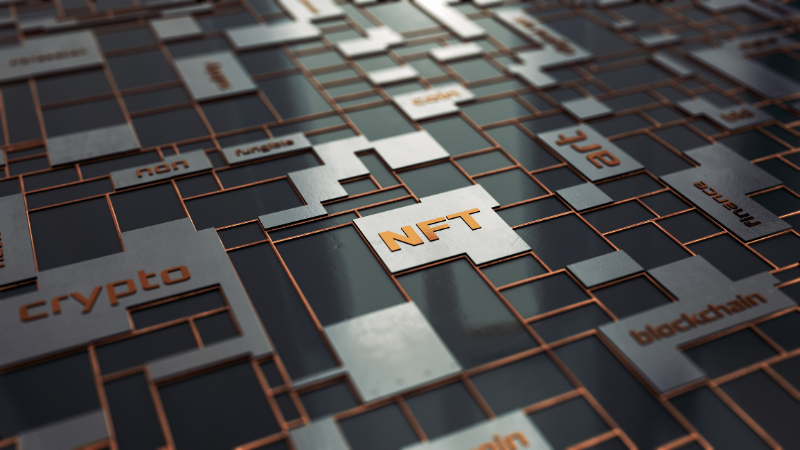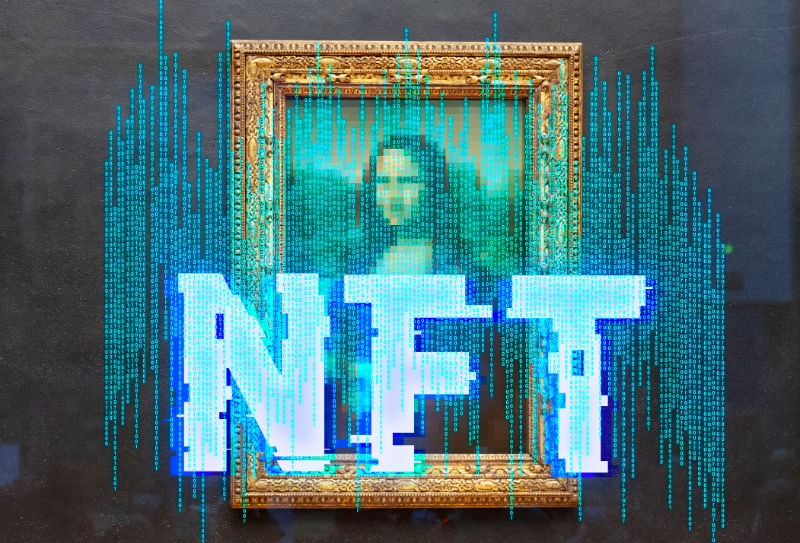
If you’ve spent any significant time online, then you may have come across the terms “cryptocurrency” and “NFTs.” You might have heard about the demand for Bitcoin, and chances are, you may have even read about the buzz surrounding NFTs and the art world. You’re seeing these words floating around the internet, but do you know the difference between cryptocurrency and NFTs? Don’t worry; we’ll get you sorted!
What’s more, once you get a clearer understanding, we’ll tell you about how you can use both cryptocurrency and NFTs to expand your real estate portfolio and make even smarter investments. Yes, that’s right – cryptocurrency and NFTs are very relevant in the world of real estate.
Curious about how it all works? Read on!
Table of Contents:
Cryptocurrency 101

In the simplest terms, cryptocurrency is digital money. It’s money that was created and exists on the internet. Now let’s break this down. The word “crypto” comes from “cryptography,” which is what secures the currency. It’s made up of information and communication techniques that, in turn, are made of mathematical concepts and algorithms to encode messages in ways that are extremely difficult to decipher. Currency is, well, money.
Thus, cryptocurrency is a virtual currency that is secured by cryptography. It’s based on a large network distributed across numerous computers. This network is called blockchain. You can think of it as a distributed ledger shared, synced, and connected across many sites and accessible by many people.
Because of the “crypto” part, cryptocurrency is extremely secure and impossible to counterfeit and double-spend.
Another characteristic of cryptocurrency is that unlike regular real-world currency circulating at the moment, cryptocurrency is not issued by any public or private entity, such as a government or a bank. It is completely decentralized. This makes cryptocurrency immune from any government interference, interruption, and manipulation.
What makes cryptocurrency valuable is that it is not unlimited. Cryptocurrency is finite, which is why those who have some cryptocurrency in their portfolios don’t spend it (though of course, one may do this, but we’ll get to this later). Rather, they invest it. Many people view cryptocurrency the same way others view stocks and bonds, and perhaps that’s an easy and effective way to think of it.
Bitcoin is the most valuable cryptocurrency, and certainly the most well known, and widely traded. It was first made available in 2009, and as of May 2022, there have been a total of 19 million Bitcoins mined, with a total market cap of $576 billion. One Bitcoin is worth $23,460. Only 21 million Bitcoins will ever exist.
Bitcoin is not the only cryptocurrency that exists, though. There are others such as Ethereum (ETH), Cardano (ADA), Solana (SOL), and Binance Coin (BNB). These are all called “altcoins” and are also legitimate cryptocurrency. These are used in many popular virtual platforms such as Decentraland and The Sandbox.
One important thing to note about cryptocurrency is that though it is a form of currency, the Internal Revenue Service (IRS) treats it as a financial asset or a property.
Got it. Now, what’s an NFT?

NFT stands for “non-fungible token.” A “token” is an item. “Fungible” means that one item is the equivalent or holds the same value as the same item. It’s an economic term that means one item is interchangeable for another.
For example, one orange is the equivalent or possessing the same value as another orange. A dollar bill possesses the same value as another dollar bill. Therefore, “non-fungible” means that one particular token can never be the equivalent or possess the same value as another token, no matter how identical they might be to each other. Therefore, an NFT is a completely unique item.
On the internet, an NFT is a cryptographic asset. It is a new form of digital token. The same securities that protect cryptocurrency protect NFTs. Like cryptocurrency, these also exist on the blockchain, but NFTs cannot be replicated. This is why NFTs are considered very valuable, and also why NFTs have found a comfortable home within the world of art. Owning an NFT is similar to owning a piece of irreplaceable art.
NFTs are digital representations of real world items, such as artwork, blueprints, an individual’s identity and even real estate deeds and property rights, and may be purchased through cryptocurrency.
Okay, so what is the difference between cryptocurrency and an NFT?
Both cryptocurrency and NFTs work because of cryptography. Both are considered digital and virtual assets. Both are based on the same software and even technology.
The easy difference between cryptocurrency and NFTs are:
- Cryptocurrency is fungible. One Bitcoin is equivalent to another Bitcoin.
- NFTs are not fungible. One NFT can never be equivalent to another NFT.
Advantages and challenges of cryptocurrency and NFTs

One of the biggest advantages of cryptocurrency is that it makes transactions faster and easier. Because it doesn’t need to pass through any banks, cryptocurrency is more secure than real-world currency. Its decentralized characteristic makes it immune to crashes at a point of failure. There are no transaction costs involved. One can make transactions at any time of the day and virtually no limits to purchases. Cryptocurrency can also generate profits through investments.
On the other hand, the valuation of cryptocurrency can be volatile. Regulations for cryptocurrency are also quite loose since it is not governed by any one public or private entity. There’s also the possibility of data loss, especially when technology changes. Scalability is another concern. Cryptocurrency may be increasingly becoming widespread in use, but conventional currency is still being used more.
As for the benefits of NFTs, transparency makes a strong case for its applications. Once an NFT is yours, it’s yours, and proving ownership is not going to be a problem. Proof of authenticity is verifiable via the blockchain. NFTs can even resolve unwanted instances of fraud.
Investing in NFTs is open and accessible to anyone with an internet connection and is interested.
On the other hand, there can be uncertainty when dealing with NFTs such as art pieces in terms of actual value. An NFT’s worth is that the token will be used in the future to be traded. NFTs are also volatile and they do not generate revenue per se.
The biggest downside to both is that both require immense amounts of energy to trade. Cryptocurrency is generated by mining large amounts of data, which in turn takes gigantic amounts of energy. It’s for this reason that those who dominate the cryptocurrency landscape are larger finance firms.
Cryptocurrency, NFTs, and real estate

Now that we have a clearer basic understanding of cryptocurrency, NFTs, and the difference between the two, we can look at how cryptocurrency and NFTs are meaningful to the world of real estate.
NFTs have been gaining lots of attention not only in the world of art, but in real estate as well. More and more people are becoming interested in the value benefits that come from NFTs.
As investors, it’s important to familiarize ourselves with the potential of new and emerging markets brought about by cryptocurrency and NFTs. And markets are growing every single day. It’s now become important to look into just how to work with both cryptocurrency and NFTs as feasible tools for navigating real estate.
Because NFTs are virtual representations of real-world items such as blueprints and property rights, NFTs can also embody real estate deeds of real estate property in real life. NFTs are now emerging as tools to represent ownership of physical items, such as real estate property on blockchain networks.
NFTs have extended into real world assets and properties such as luxury homes, condominiums, and other residential properties. That’s what makes NFTs exciting for investors and those looking to expand their real estate portfolios. NFTs promote entirely new markets and forms of investment.
As this article from 101 Blockchains says, real estate trading can be simplified by incorporating relevant metadata (which will include everything about the property such as its selling price, dimensions of the property, property documentation, and so on) into an NFT, which if you will recall, is completely unique.
Today, NFTs can serve as great tools and instruments enabling purchase and sale of real estate properties. Luxury real estate properties have been sold and purchased through cryptocurrency. Some firms have made availability of ownership through NFTs.
In the real estate market, NFTs provide a layer of assurance and security because of the integrity of the blockchain. These provide much-needed peace of mind for buyers, as well as offer the confidence to push through with their real estate purchase decisions. What’s more, potential buyers can find opportunities for simplifying loan applications for the property they want to buy.
NFTs make property transactions more efficient and streamlined. It empowers buyers to have more agency and take control of their real estate assets within minutes.
Are you ready to explore the metaverse?

Now, there’s real estate in the real world that can be represented by NFTs, and there’s also virtual real estate. Here’s where it gets interesting. Virtual real estate is absolutely real, and just like real estate trading in the real world, virtual land costs real money.
These days, familiar and established brands are logging into the metaverse. What was once the space for games, virtual and augmented reality have now become a whole new exciting universe for big business, art, entertainment, fashion, commerce, and yes, real estate.
Big-name lifestyle and fashion brands have bought in on their own spaces in the metaverse, staking their claim in the new Gold Rush of the digital age. Chanel, Dolce and Gabbana, and even Adidas have all planted their flags firmly into the virtual space with flagship stores, virtual events, and exclusive online-only offers.
People have spent serious money on virtual land and virtual property. Late in 2021, a man spent close to half a million dollars to live next door to his favorite musical idol, Snoop Dogg in The Sandbox, a virtual world that uses Ethereum, the decentralized blockchain platform. Many might consider The Sandbox a game, but it’s being used as a platform for creating virtual spaces that can be monetized for gaming.
Speaking of games, many games with online platforms are looking into adding cryptocurrency to their gameplay as well. For example, the popular online game Roblox also has its own virtual currency in the form of Robux, but is planning to develop its own official cryptocurrency soon.
In this virtual world, one can literally build anything if they owned a piece of the virtual landscape. This is why giant brands are flocking to the metaverse. They can build new and exciting ways for people to experience what their brand is about. For investors, it means getting a piece of valuable virtual real estate with the possibility of transforming it into something that will generate real and considerable returns down the line. This is how real virtual real estate is.
Experts think that blockchain technology, cryptocurrency, and NFTs will get even bigger in the near future, disrupting major industries such as finance, law, and real estate.
Key takeaways
|
Let Juan Rubio guide you through your investments

Are you ready to explore new and exciting opportunities in real estate with cryptocurrency and NFTs? It’s a virtual playground out there, and it can get wild. The first step is working with real estate professionals who not only have expertise in the real world real estate market, but are also comfortable and adept at navigating virtual platforms and walking you through every step of the way.
Juan Rubio is the Wolf of Real Estate. Always hunting for deals and taking care of his pack, Juan Rubio is someone you need to work with when you’re ready to up your real estate game with cryptocurrency and NFTs. An aggressive negotiator, Juan Rubio provides unmatched customer service, breaking records for highest price per square feet for all his sellers, and getting the best deals for all his buyers.
Juan Rubio has just ranked in the Top 100 for Real Estate for volume and is one of the most trusted names in real estate in Las Vegas.
Got a question for Juan Rubio about cryptocurrency, NFTs and how you can take advantage of both in the real estate realm? Juan Rubio is available 24/7!
Call him at 702.913.3044 or contact him here.
